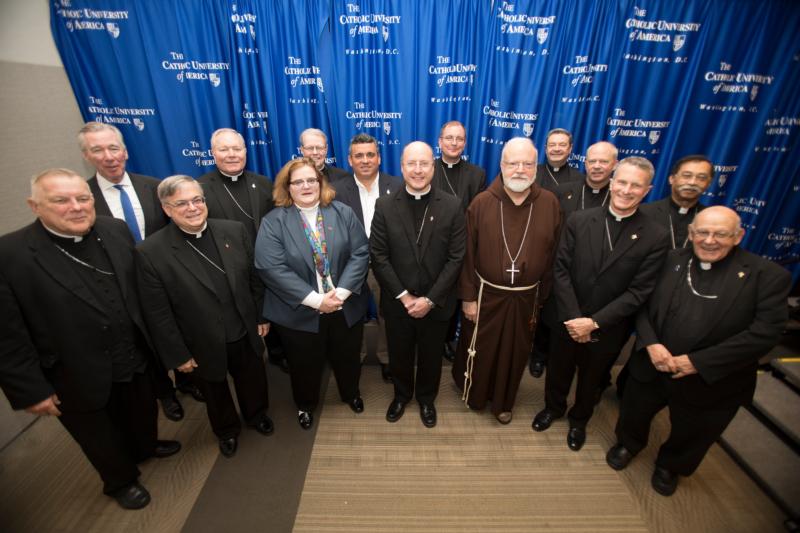By Christopher White, The Tablet’s National Correspondent

WASHINGTON, D.C. – A conference at the Catholic University of America (CUA) last week brought together clerical sex abuse survivors and over a dozen Catholic bishops for a daylong discussion on “healing a wounded family,” rather than on institutional reform.
As the U.S. Catholic Church has faced the latest wave of the clergy sex abuse crisis, this meeting was the latest event in a series of conferences that has taken place at CUA and throughout the country with an aim at confronting the challenge of clergy abuse and bishop accountability.
According to organizers, “Pushing Back Against the Darkness,” was distinctive in that it sought to provide a level playing field for “honest conversations about how the Church has failed” between survivors and bishops, in a setting that guaranteed both anonymity for abuse survivors and confidentiality for discussion participants.
While members of the press, including The Tablet, were invited to attend, the content of the speeches and small group conversations were off the record.
Headlined by Cardinal Sean O’Malley, the archbishop of Boston and the president of the Pontifical Commission for the Protection of Minors, and organized by Spirit Fire, a restorative justice ministry founded by abuse survivors, the day began with a morning Mass celebrated by Bishop Chad Zielinski of Fairbanks, Alaska, and was bookended with a closing prayer service led by Bishop Ed Burns of Dallas, Texas.
Teresa Pitt Green, a co-founder of Spirit Fire, told The Tablet that the Catholic University of America was viewed as “neutral ground,” as it’s the bishops’ university in the United States, and provided a more impartial location than if they had met in a particular diocese.
Green said that event came about after she and Spirit Fire co-founder, Luis Torres, Jr., began conversations with Monsignor Stephen Rossetti, a research associate professor in the School of Theology and Religious Studies at CUA and former president of St. Luke’s Institute, a mental health institute for priests.
Survivors, Green observed, have been “wounded in relationship and must heal in relationship.”
Green said that the event was “bigger than we ever expected,” bringing together chancellors, victim assistance coordinators, canon lawyers, child protection experts, and bishops from over 20 dioceses.
Spirit Fire is founded on the principles of restorative justice, which aims to bring about reconciliation through engaging both the victim and the offender.
Green applauded bishops agreeing to participate whom, she described, as “being brave enough to listen, but also willing enough to speak.”
She also said that the fact that so many bishops responded to the invitation so quickly – with invites only being sent out in March, requiring many of them to change their schedules in order to attend – was a sign of their commitment to survivors and the broader issue.
“The focus is usually on a lot of anger in these conversations, which is natural when a family is wounded,” she told The Tablet, “but here wounded fathers and wounded children met together.”
She added that many bishops are “deeply brokenhearted” at the Church’s failings on abuse and are “actively grieving,” because “they know they represent something that has hurt people.”
In order to move forward, she insisted, relationships between survivors and bishops must be a necessary starting point for healing.
Bishop Shawn McKnight of Jefferson City, Missouri told The Tablet that he agreed to participate and share a personal reflection at the event because “every bishop is obliged to do everything we can on this issue.”
Citing Pope Francis’s closing remarks from the Vatican summit on sex abuse this past February, Bishop McKnight said that the Church must “throw everything we have at confronting this evil.”
While he said that “meetings with survivors can be difficult and painful, it’s certainly something we need to do.”
He said the virtue of last week’s conference is that it focused particularly on “hearts and minds” and that “everyone in that room loved the Church.”
Going forward, he said that while the upcoming meeting of U.S. bishops this June – in which new measures for bishop accountability are expected to be voted on and approved – serves as a necessary first step, he said that it’s just that.
“We need to seriously reflect on what are we learning from this experience about how we govern in the Church,” Bishop McKnight said.
Eileen Dombo, an associate professor of the National Catholic School of Social Service at CUA who worked with Spirit Fire to help organize the gathering, told The Tablet that “restorative justice occurs in relationships” and she was happily surprised at the relationships that “blossomed” out of bring the group of survivors and bishops together.
“So much is taken from someone who has experienced abuse,” she said. “Events like this are a necessary part of the healing process.”
As survivors and bishops alike look ahead, Dombo says she hopes such a model as the one that was one display at CUA can be used throughout the country and even globally, as the worldwide Church continues to confront this crisis.
Green concurred, adding “it’s not just about a policy, and it not about operationalizing a policy.
“It’s a family that’s got to heal,” she said.
